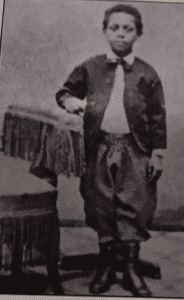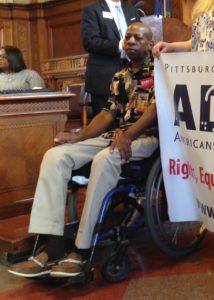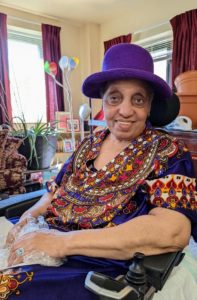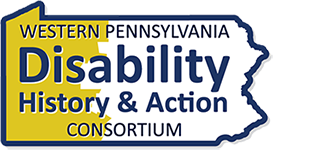Download this press release in PDF format.
FOR IMMEDIATE RELEASE
Contact:
Alonna Carter- Donaldson
alonna.carter@gmail.com
Disability History Consortium Documenting Stories
of People of Color who have Disabilities
Pittsburgh, PA, July 17, 2022. The Western Pennsylvania Disability History and Action Consortium (WPDHAC) has launched a new, ongoing effort to document and share stories of people with disabilities who are people of color.
The history of people with disabilities has only recently become part of the narrative of American history. Within this context, the stories of people of color who have disabilities are especially untold and under-represented. This omission is coming to light as our nation grapples with the deep levels of racial inequity in our society.
Nationally known activist Andraea Lavant, who speaks nationally on the topic of race, disability and oppression, notes that people who live at the intersection of race and disability have been overlooked, not only in the narrative of disability history but in the contemporary disability rights movement.
To address this absence, the Western Pennsylvania Disability History and Action Consortium has begun to tell their stories. In addition to expanding the historic record, these stories provide a starting point for community conversations about the struggles of people of color who have disabilities, and their inclusion in the broader struggle for racial equality, civil rights, and social justice.
The first set of histories are set for public release in July 2022 and feature five individuals who represent diverse types of disabilities, past eras of disability services, pivotal disability rights movements, and seminal leadership.
These subjects are:

Henry Bell (b. circa 1862-d. c. 1892)
Bell was a deaf child who lived in the Hill District neighborhood of Pittsburgh. His mother was from Arkansas while his father was born in Pennsylvania. Bell became the first student at the Western Pennsylvania School for the Deaf (WPSD), and graduated from the school when he was 18 years old in 1880. Bell became a barber and died in Wellsburg, Ohio. In the 19th century, being both Black and deaf meant being limited in society and in educational opportunities.
According to an article in the Pittsburgh Post-Gazette dated January 19, 1895, Bell arrived at the Sabbath Day School at the Third Presbyterian Church where he was turned away several times by the instructor of the school due to not being able to communicate. Despite continuously being dismissed, Bell returned and was eventually accepted, and invited other deaf children who he befriended to the school. Realizing that Bell and other children like him needed a school to fit their needs, teacher Joel Kerr and other staff embarked on creating the Western Pennsylvania School for the Deaf. Bell’s spirited persistence opened the doors for many other children and laid the foundation for the WPSD.

Milton (“Skip”) Henderson (1961-2019)
Henderson became paralyzed because of a car accident. He became a renowned local and statewide disability rights advocate. He was a board member and later an employee of Three Rivers Center for Independent Living. He served on the statewide Independent Living Council and the City of Pittsburgh-Allegheny County Task Force on Disabilities until his death in 2019. Writing on his online obituary page in 2019, Amy Selders wrote: “Milton fought for the rights of all people with disabilities as if his own life depended on it.”
Henderson was an African American man living with a physical disability; his courage of conviction and responsibility to fighting for the rights of people with disabilities has not been forgotten and continues to inspire many.
Marilyn McKinney (1947-2004)

McKinney worked for the Pittsburgh Public Schools for 30 years, most notably as program officer for the Program for Students with Exceptionalities. She served in the Pittsburgh Branch of the NAACP as the Statewide Assistant Secretary and the Second Secretary. She created a group called African Americans Make-A-Wish, to provide opportunities to children under the age of eighteen with a life-threatening illness. Other community work included the Kingsley Association, the charitable group Freedom Unlimited, and the Greater Pittsburgh Alliance of Black School Educators.
The Pittsburgh Local Task Force on the Right to Education named an award in McKinney’s honor. The award recognizes Pittsburgh Public Schools employees who demonstrate “outstanding commitment and service” to students with disabilities. McKinney was an African American woman who was not only a champion in her community but also for children of color in the disability community.
Florence Reed (b. 1944)

Reed is the founder of Working Women with Disabilities. She served on the Pennsylvania Developmental Disabilities Council. Her tenure included serving as vice-chair of the Council and chair of the Advocacy Committee. Reed is a member of Alpha Kappa Alpha Sorority, Inc., and a graduate of the University of Pittsburgh. Reed’s advocacy began before she became disabled when she worked as a speech therapist for Pittsburgh Public Schools. While having a disability may have changed her life, it also strengthened her resolve.
In her interview with Alonna Carter-Donaldson, Reed said “Disability is not a death sentence. In fact, it’s probably one of the best things that ever happened to me, because it has taught me how to accept people… all people, no matter who they are.” While being both African American and part of the disability community can come with its own set of challenges, Reed inspires women of all backgrounds to be confident and persevere beyond any boundaries.
Maurika (“Rika”) Moore (b. 2001)

Moore is a young adult with epilepsy who graduated from Washington High School (Washington County) in 2021. Her family, including her mother Cicely Moore and her father Ron Moore (Washington High School basketball coach), started a fundraiser called Rika’s Hearts to raise money for the annual Pittsburgh Fun Run/Walk for Epilepsy and to help with Maurika’s medical care. The fundraiser has expanded its outreach to the surrounding community by contributing to various community causes. Rika’s Hearts continues to raise awareness about the costs associated with treatment and to connect communities with much needed resources. Moore is part of the next generation of BIPOC and disabled advocates making profound change across communities.
Alonna Carter-Donaldson is the project scholar for the “Intersection of Race and Disability” project. She leads the research and writing of the histories and will complete a master’s degree in Public History at Duquesne University in 2022. She also holds a bachelor’s in Philosophy and Pre-Law from Carlow University and a master’s in Professional Writing from Chatham University. Among her many professional and volunteer accomplishments is her work as historian for the Dr. Edna B. McKenzie Branch of the Association for the Study of African American Life and History (ASALH). Carter is a resident of Verona.
Carter-Donaldson’s research on these stories explores questions that lie at the intersection of race and disability, such as:
- What do we need to know about people of color who live at the intersection of race and disability?
- How have people of color led efforts to establish disability rights?
- How has race affected access to treatment or services?
- How have people faced interpersonal or systemic racism and ableism?
Throughout 2022 and beyond, Carter-Donaldson will share the project’s first five stories at community gatherings and in a variety of media. An initial presentation of the stories was held On May 6, 2022, at the Envision Conference sponsored by the Western Pennsylvania School for the Blind.
A community advisory committee guides this storytelling project. Members are:
- Dr. Diego Chaves-Gnecco, Developmental-Behavioral Pediatrician; Director, Salud Para Niños (“Health for the Children”) bi-lingual clinic
- DaNia Childress, Associate Curator, African American History, Heinz History Center
- Melva Fair, Executive Director, CLASS Community
- Dustin Gibson, Access, Disability and Language Justice Coordinator, PeoplesHub; Member, Policing in Allegheny County Committee
- Chaz Kellem, Program Manager, Enterprise Equitable Health Institute; Member, Pittsburgh Human Relations Commission; President, Achieva Board of Directors
- Michelle Walker, Founder of Lend an Ear Consulting
- India Scott, Self-advocate
Major funding for the effort comes from the “Race and Disability” initiative of the FISA Foundation. According to Executive Director Kristy Trautmann, “FISA Foundation is incredibly proud of the work of the Western PA Disability History and Action Consortium and its commitment to elevating the voices and stories of people of color with disabilities. This initiative will spotlight true heroes who fought for justice, changed the way disability is perceived, and helped to establish fundamental civil rights. Their stories will help us all to better understand the impact of racism and ableism and will inspire us to work for reform.”
The Western Pennsylvania Disability History and Action Consortium, founded in 2015, preserves and honors the historic struggle of people with disabilities to attain human and civil rights – and to share the lived experiences of today – to promote community access, participation, and equal opportunity. The Consortium uses this history—through presentations, media, events, and exhibits—to educate the public about the evolution and significance of existing laws and policies, and to advance disability rights.
For information, to suggest stories for the “Intersection of Race and Disability” project, or to schedule a presentation by project scholar Alonna Carter-Donaldson at info@wpdhac.org.


